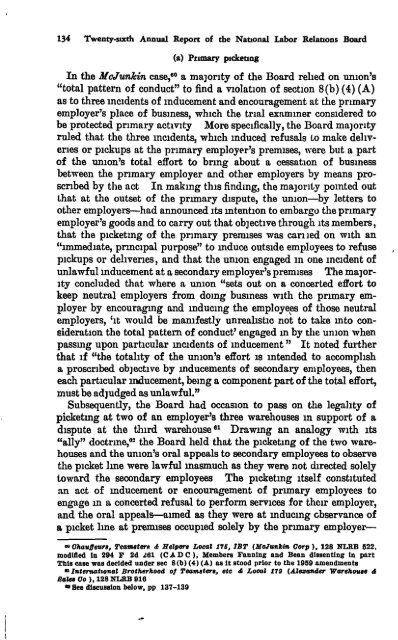TWENTY-SIXTH ANNUAL REPORT - National Labor Relations Board
TWENTY-SIXTH ANNUAL REPORT - National Labor Relations Board
TWENTY-SIXTH ANNUAL REPORT - National Labor Relations Board
Create successful ePaper yourself
Turn your PDF publications into a flip-book with our unique Google optimized e-Paper software.
134 Twenty-sixth Annual Report of the <strong>National</strong> <strong>Labor</strong> <strong>Relations</strong> <strong>Board</strong><br />
(a) Primary picketing<br />
In the McJunkin case," a majority of the <strong>Board</strong> relied on union's<br />
"total pattern of conduct" to find a violation of section 8(b) (4) (A)<br />
as to three incidents of inducement and encouragement at the primary<br />
employer's place of business, which the trial examiner considered to<br />
be protected primary activity More specifically, the <strong>Board</strong> majority<br />
ruled that the three incidents, which induced refusals to make deliveries<br />
or pickups at the primary employer's premises, were but a part<br />
of the union's total effort to bring about a cessation of business<br />
between the primary employer and other employers by means proscribed<br />
by the act In making this finding, the majority pointed out<br />
that at the outset of the primary dispute, the union—by letters to<br />
other employers—had announced its intention to embargo the primary<br />
employer's goods and to carry out that objective through its members,<br />
that the picketing of the primary premises was earned on with an<br />
"immediate, principal purpose" to induce outside employees to refuse<br />
pickups or deliveries, and that the union engaged in one incident of<br />
unlawful inducement at a secondary employer's premises The majority<br />
concluded that where a union "sets out on a concerted effort to<br />
keep neutral employers from doing business with the primary employer<br />
by encouraging and inducing the employees of those neutral<br />
employers, 'it would be manifestly unrealistic not to take into consideration<br />
the total pattern of conduct' engaged in by the union when<br />
passing upon particular Incidents of inducement" It noted further<br />
that if "the totality of the union's effort is intended to accomplish<br />
a proscribed objective by inducements of secondary employees, then<br />
each particular inducement, being a component part of the total effort,<br />
must be adjudged as unlawful."<br />
Subsequently, the <strong>Board</strong> had occasion to pass on the legality of<br />
picketing at two of an employer's three warehouses in support of a<br />
dispute at the third warehouse 61 Drawing an analogy with its<br />
"ally" doctrine," the <strong>Board</strong> held that the picketing of the two warehouses<br />
and the union's oral appeals to secondary employees to observe<br />
the picket line were lawful inasmuch as they were not directed solely<br />
toward the secondary employees The picketing itself constituted<br />
an act of inducement or encouragement of primary employees to<br />
engage in a concerted refusal to perform services for their employer,<br />
and the oral appeals—aimed as they were at inducing observance of<br />
a picket line at premises occupied solely by the primary employer—<br />
GU Chauffeurs, Teamsters t Helpers Local 175, IBT (MoJunkin Corp), 128 NLRB 522,<br />
modified In 294 F 2d 281 (C A D C ), Members Fanning and Bean dissenting in part<br />
This case was decided under sec 8(b) (4) (A) as it stood prior to the 1959 amendments<br />
a International Brotherhood of Teamsters, etc d Local 179 (Alexander Warehouse d<br />
Bales Co ), 128 NLRB 918<br />
a Bee discussion below, pp 137-139

















